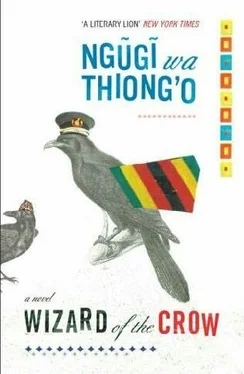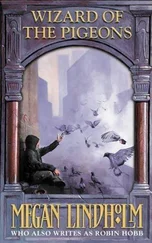A.C. did not know that he himself had somehow been the source. I will look into the matter, he assured Machokali, and he resumed his travels, having taken note of the telephone number on the poster. A.C. had many friends throughout the police and intelligence network. There were some who owed him a debt of gratitude for letting them know about the Wizard of the Crow early on, long before he and his magic had achieved fame. So it did not take long for him to get to the bottom of the source of the poster. But he was not overly concerned. All this is mere foolishness, he said to himself. The Wizard of the Crow would not be bribed or tricked into submission.
He decided not to be drawn into the power struggle between Sikiokuu and Machokali. He would leave Sikiokuu to his own schemes. He simply would continue in his search for the being that animates all things.
“True! Haki ya Mungu, I was armed with faith and hope that if I persisted, I would hear somehow, somewhere, a voice saying: The man is here.”
Kaniürü had always wanted to see his picture in a newspaper. He felt frustrated and angry with the press, because even after he had been promoted to a senior youthwinger and then to the deputy chair of Marching to Heaven, not a single newspaper had evinced an interest in him, and none had carried his picture. So when he saw two reporters packing cameras at his first seminar, he was very pleased.
The one-day seminar on The Kaniürü Memorandum on New Educational Initiatives for Youth and Women to Make Their Minds Conform to National Ideals and the Ruler’s Philosophy was going to be the first of several in different parts of the country, so a lot was riding on its success. It was being held at the Ruler’s Hall, Eldares, and it was supposed to start at ten in the morning. Attendance was abysmal. Even the members of his youthwing had not bothered to turn up, because they assumed that the seminar was intended for those who had not yet accepted parrotry as a norm. By eleven o’clock, the main speakers-a professor of the history of parrotology a professor of the philosophy and psychology of parrotology, a professor of the politics of parrotology, a professor of literary parrotology, a professor of the science of parrotology, and finally the chairman of the seminar, Kaniürü-were the only people present. They sat at the podium, waiting for the people to turn up, but the two reporters were the only ones in the audience. “We seem to be on African Time,” Kaniürü tried to joke with the reporters.
But when the expected students had not arrived by two o’clock, the reporters became restive and asked Kaniürü, When is the Ruler going to arrive? Oh, is that why they came so early? Kaniürü thought. He had hinted to the newspapers that the Ruler might open the seminar, but Kaniürü, knowing the present state of the Ruler, had not even bothered to broach the subject with him. Kaniürü told them that he would not come but had sent a message. They asked if he could please give them a copy of the message so that they could leave. This made Kaniürü decide to begin the seminar even without an audience, for, as he put it, quoting a proverb, the sun never waits for anybody, not even a king, and he was not yet a king. He advised the restive reporters to focus their cameras on the podium and not the empty seats. And he offered himself for an interview, but after the meeting.
Kaniürü opened the seminar by saying that toward its close he would convey the message of goodwill from the Head of State to the seminar. Meantime, he had a few words to say. The queuing mania in the country had been started and fueled largely by university students, and their bad example was unfortunately followed by many people till-
But before he had said another word, he saw a long line of young people approaching the hall. Elated, he hastened to amend his remarks.
“It does not of course mean that all queues are wrong and immoral in all places at all times,” Kaniürü said, gesturing the newspaper people to train their cameras on the arrivals. “When you get orderly queues made by intelligent people who know why they are falling in line and where their queues are headed, like these good youth who are about to enter the hall… let me welcome them at the door.”
Kaniürü, eager for a photo op, was so excited that he almost tripped over himself as he left the podium and headed for the door to welcome the youth.
Suddenly, Kaniürü found himself surrounded by the youth, who were brandishing Wanted posters showing him arm in arm with Nyawlra, shouting: He is here! He is here! The professors were confused by the turmoil, but when they saw the posters they jumped through the windows, yelling that they had been misled into attending a seminar organized by a terrorist. The reporters were busy clicking away, recording this extraordinary scene of students tying Kaniürü’s hands together and dragging him along, others pushing him from behind, still others prancing about on the sides, waving their posters in the air. They took him to the nearest police station.
When Kaniürü told the police who he was, they did not believe him. Stop lying, they said, pointing at his picture on the Wanted poster, adding in Kiswahili: Is this not you holding hands with that woman terrorist Nyawlra? Kaniürü agreed that the picture was indeed of him, but he was angry when they refused to hear any qualification, interrupting him with laughter, especially when he told them to call the State House to find out the truth of his identity. What made the police even more suspicious was that when they finally offered to call the Minister of State, Sikiokuu, the prisoner looked terror stricken, beseeching them to contact the Ruler instead.
When the police called the Minister of State to ask what they should do with the criminal, they failed to reach Sikiokuu or any other person in charge who could dispose of the matter. So Kaniürü was held at the police station overnight.
Kaniürü’s picture, his hands roped together, appeared on the front page of the two main newspapers, next to an image of the Wanted poster; the caption in both instances was STUDENTS APPREHEND NYAWIRA’S ASSOCIATE.
Ironically, the picture and the story saved him from having to spend more time in prison, for when ASS Kahiga saw the newspaper, he called the State House to ask why his boss had been arrested and what he should do about it. The Ruler ordered Kaniürü’s immediate release.
When Sikiokuu was asked about the poster, he claimed he did not mean to harm Kaniürü, his only interest was to capture Nyawlra, but unfortunately the only picture of her that he had showed her holding hands with Kaniürü. Now the Ruler was hearing of Kaniürü’s connection to Nyawlra for the first time. As he put it, There is more to this than meets the eye, and I will get to the bottom of it! Still, he decreed that Kaniürü’s image be removed from the poster.
Kaniürü, who used to claim that he was brought up by a blind grandmother, his parents having died when he was only a baby, the truth being that it was his grandmother who had died then, was dealt further denigrations when a few days later the newspapers carried pictures of his aged parents from a rural village looking for him in the streets of Eldares after they had seen images of him being dragged along the road.
So despite his release, Kaniürü remained bitter that his first-ever picture in a newspaper had been a humiliating fiasco.
After the ordeal, Kaniürü viewed Sikiokuu, the students, and newspapers as a grand alliance against him, and this intensified his determination to seek vengeance. First he unleashed his thugs to beat students wherever they were to be found. This caused a scandal throughout the country, but it did not deter him. Against Sikiokuu he decided to try to capture Nyawlra himself, thwarting Sikiokuu’s chances of winning the race. He would effect this through his own capture of the Wizard of the Crow, convinced as he had always been that there was a link between the two. Kaniürü would also get from him information on the women of the people’s court.
Читать дальше












